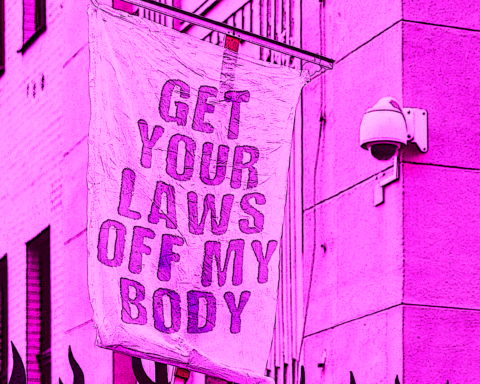
I am a woman of faith. I have grown up in the Presbyterian Church (U.S.A.) and have a deep love and appreciation for my denomination. Our church’s involvement in the Religious Coalition on Reproductive Choice is one of many reasons that I am proud to be a Presbyterian.
As it has in most if not all recent assemblies, the topic of reproductive rights came up for discussion at the 222nd General Assembly in Portland, this time in the form of Commissioners’ Resolution 10-16: To Withdraw the Presbyterian Church (U.S.A.) from Religious Coalition for Reproductive Choice (RCRC). This resolution, which was ultimately defeated in Committee by a vote of 65-5 and on the plenary floor by a vote of 431-132, would have called on the Presbyterian Mission Agency and the PHEWA network Presbyterians Affirming Reproductive Options (PARO) to withdraw immediately from membership in the Religious Coalition for Reproductive Choice.
The Commissioners’ Resolution, introduced by Commissioner Justin Marple of the Presbytery of Western New York (with the required concurrence from Commissioner Karen Mizrahi of the Presbytery of the Pacific), objected to the denomination’s involvement with the RCRC on the grounds that the RCRC pushes for “abortion on demand” and also expressed great concern over the number of abortions being performed in recent years.
___________________________________________
It’s time we cleared up this terminology: Pro-choice is not the opposite of pro-life.
___________________________________________
I have gone over the RCRC’s website with a fine tooth comb and cannot find an instance in which “abortions on demand” was listed as one of their goals. Instead, I found a website that recognizes that the decision to bring a child into this world is a deeply personal decision best left to a woman to discern for herself, in consultation with her family and faith.

The Presbyterian Church (U.S.A.) and its predecessor denominations have struggled with the issue of abortion for more than 40 years. In 1970, the General Assembly of the UPCUSA (the “Northern Church”) voted to declare that, “the artificial or induced termination of a pregnancy is a matter of careful ethical decision of the patient… and therefore should not be restricted by law.” [1] To me that statement sounds remarkably similar to this quote found on the RCRC’s website: “At RCRC, we believe the decision to become a parent or to become a parent again, when and under what circumstances, are deeply personal decisions and best left to a woman to discern for herself, in consultation with her family, faith, and others she might bring into the conversation.”
Something that is especially troubling in the debates surrounding abortion and reproductive justice is that the language has been narrowed to ‘pro-life’ and ‘pro-choice’. Recently-elected Stated Clerk Rev. Dr. J. Herbert Nelson wrote a piece about Planned Parenthood in Advocacy as Discipleship stating, “We have forgotten or never been made aware of the complexities of bringing children into this world. Or, we do not understand the impact that remains as scars for so many women in our society who are victims of rape, incest, and a host of other violent acts upon their personhood. Our faith calls us to an awareness of the issues and the individual. We are all pro life, however there are variances in how we live and move and have our being.”
___________________________________________
I cannot faithfully speak to the topic of abortion without mentioning the fact that this is an issue that largely impacts racial minorities and those living in the margins.
___________________________________________
It’s time we cleared up this terminology: Pro-choice is not the opposite of pro-life. Advocates of the religious movement for reproductive choice accept that there is disagreement among people of faith and respect that disagreement. There is not a consensus on when life truly begins, and Presbyterians have widely differing opinions on this topic. In fact, many women who identify as pro-choice could not imagine themselves ever having an abortion. These women simply believe that each woman has the right to make her own decisions about her body, just as they want that right for themselves.
 I cannot faithfully speak to the topic of abortion without mentioning the fact that this is an issue that largely impacts racial minorities and those living in the margins. In her 2006 article for Presbyterian Women’s magazine Horizons “What Does Pro-Choice Really Mean?”, Dr. Sylvia Thornson-Smith puts it this way: “In a culture where financial resources guarantee access to reproductive options, including abortion services, women of color and women who are poor have been particularly disadvantaged in their right to choose.” The RCRC recognizes this problem and has been calling on the government to partner with them to ensure that all women have equal access to safe, legal, and moral reproductive care, including abortion.
I cannot faithfully speak to the topic of abortion without mentioning the fact that this is an issue that largely impacts racial minorities and those living in the margins. In her 2006 article for Presbyterian Women’s magazine Horizons “What Does Pro-Choice Really Mean?”, Dr. Sylvia Thornson-Smith puts it this way: “In a culture where financial resources guarantee access to reproductive options, including abortion services, women of color and women who are poor have been particularly disadvantaged in their right to choose.” The RCRC recognizes this problem and has been calling on the government to partner with them to ensure that all women have equal access to safe, legal, and moral reproductive care, including abortion.
It is also important to recognize that the RCRC does not just work as a pro-choice agent. In addition to access to abortion care, the RCRC also advocates for access to contraception, access to sexuality education, and religious liberty. The commissioner who introduced this resolution remarked that he was concerned over the number of abortions in the recent years. One of the most significant and effective ways to prevent unwanted pregnancies is to invest in comprehensive sexuality education and expand access to contraceptives. These are both things that the RCRC seeks to accomplish.
___________________________________________
When am I going to be trusted, as a faithful woman of God, to make my own decisions about my own body?
___________________________________________
While sitting at the General Assembly listening to those speaking on this resolution, I felt a wide array of emotions.
 At first, I was frustrated. We have been here so many times before. This is not the first time that a resolution has tried to sever the PC(USA)’s ties with the RCRC, and I do not expect it to be the last. Another point of frustration for me personally had to do with who submitted the resolution. I find the fact that a male commissioner wrote this resolution (even if he found a female commissioner to concur with him) belittling. As a woman, I am tired of men trying to take away my right to choose. When am I going to be trusted, as a faithful woman of God, to make my own decisions about my own body? In the famous words of Rachel Green: No uterus, no opinion.
At first, I was frustrated. We have been here so many times before. This is not the first time that a resolution has tried to sever the PC(USA)’s ties with the RCRC, and I do not expect it to be the last. Another point of frustration for me personally had to do with who submitted the resolution. I find the fact that a male commissioner wrote this resolution (even if he found a female commissioner to concur with him) belittling. As a woman, I am tired of men trying to take away my right to choose. When am I going to be trusted, as a faithful woman of God, to make my own decisions about my own body? In the famous words of Rachel Green: No uterus, no opinion.
Fortunately, frustration was not the only feeling I was experiencing. Many of those who rose to speak against the resolution gave me hope. Donna Riley rose and stated that our church takes “a pro-choice position that trusts women to discern God’s will.” I could not have said it better myself. My faith was further restored when the commissioner’s resolution was voted down by a vote of 431-132.
Women are strong. Women are powerful, intelligent, faithful, and capable of making these important choices. The RCRC empowers women to make choices for their own body and their own circumstances. I am proud to be affiliated with an organization and denomination that respect my decisions and my capability to make such decisions.
__________________________________________________
[1] Minutes of the 182nd General Assembly (1970), United Presbyterian Church in the USA., p.891
AUTHOR BIO: Mara Sawdy is a Young Adult Volunteer from West Newton, Pennsylvania. She is currently serving at the Office of Public Witness, focusing on domestic and environmental issues, and at Miriam’s Kitchen, as a case manager working with homeless individuals in Washington, DC. Mara graduated from Westminster College in 2015. She majored in environmental science with a minor in peace studies.






Unbound Social